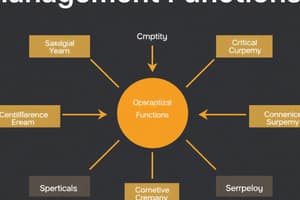Podcast
Questions and Answers
What does the 'task' component of an organization refer to?
What does the 'task' component of an organization refer to?
- The ways in which the organization is structured
- The organization's mission, purpose, or goals (correct)
- The tools and techniques used in the organization
- The organization's human resources
Which managerial function involves assessing the performance of the organization?
Which managerial function involves assessing the performance of the organization?
- Leading
- Organizing
- Planning
- Controlling (correct)
What is the primary role of a whistleblower?
What is the primary role of a whistleblower?
- To inform authorities of wrongdoing (correct)
- To enhance employee satisfaction
- To maintain secrecy within an organization
- To promote organizational goals
Which of the following is NOT a component of work attitudes?
Which of the following is NOT a component of work attitudes?
Which of the following is NOT one of Robert Katz's managerial skills?
Which of the following is NOT one of Robert Katz's managerial skills?
Which trait is NOT a component of emotional intelligence according to Daniel Goleman?
Which trait is NOT a component of emotional intelligence according to Daniel Goleman?
What typically contributes to emotional stress at work?
What typically contributes to emotional stress at work?
What do values primarily reflect?
What do values primarily reflect?
Which sign indicates excessive stress at work?
Which sign indicates excessive stress at work?
What do work attitudes encompass?
What do work attitudes encompass?
A code of ethics is established to:
A code of ethics is established to:
How are emotions characterized in the workplace?
How are emotions characterized in the workplace?
Which managerial skill is essential for analyzing complex problems?
Which managerial skill is essential for analyzing complex problems?
What is emphasized in the emotional intelligence trait of social skill?
What is emphasized in the emotional intelligence trait of social skill?
What is the emotional labor in a workplace context?
What is the emotional labor in a workplace context?
Which of these factors is NOT associated with stress at work?
Which of these factors is NOT associated with stress at work?
What does the 'people' component of an organization encompass?
What does the 'people' component of an organization encompass?
Which of the following is most closely linked with motivation in the context of emotional intelligence?
Which of the following is most closely linked with motivation in the context of emotional intelligence?
Which component of work attitudes relates primarily to employee feelings?
Which component of work attitudes relates primarily to employee feelings?
What psychological impact can layoffs have on employees?
What psychological impact can layoffs have on employees?
What characterizes negative stress?
What characterizes negative stress?
Which of the following is a symptom of being out of balance emotionally?
Which of the following is a symptom of being out of balance emotionally?
Type A individuals are typically described as:
Type A individuals are typically described as:
Which barrier to balance is related to personal limitations?
Which barrier to balance is related to personal limitations?
What is a recommended strategy to improve work-life balance?
What is a recommended strategy to improve work-life balance?
Which of the following is an example of a physical symptom of being out of balance?
Which of the following is an example of a physical symptom of being out of balance?
How do Type B individuals typically cope with stress?
How do Type B individuals typically cope with stress?
Which of the following barriers to balance is closely related to professional aspirations?
Which of the following barriers to balance is closely related to professional aspirations?
What kind of stress is considered to have a negative impact on performance?
What kind of stress is considered to have a negative impact on performance?
Which of these does NOT represent a symptom of being out of balance personally?
Which of these does NOT represent a symptom of being out of balance personally?
Flashcards
Task
Task
The overall purpose or goal of an organization.
People
People
The people who work for the organization, including employees, managers, and executives.
Structure
Structure
The way an organization's work is structured, from individual roles to department arrangements, and the overall layout of the organization.
Technology
Technology
Signup and view all the flashcards
Skill (Definition)
Skill (Definition)
Signup and view all the flashcards
Technical Skill
Technical Skill
Signup and view all the flashcards
Human Skill
Human Skill
Signup and view all the flashcards
Conceptual Skill
Conceptual Skill
Signup and view all the flashcards
Emotional Intelligence (Definition)
Emotional Intelligence (Definition)
Signup and view all the flashcards
Values
Values
Signup and view all the flashcards
Whistleblowers
Whistleblowers
Signup and view all the flashcards
Work Attitudes
Work Attitudes
Signup and view all the flashcards
Job Satisfaction
Job Satisfaction
Signup and view all the flashcards
Organizational Commitment
Organizational Commitment
Signup and view all the flashcards
Affective Component
Affective Component
Signup and view all the flashcards
Cognitive Component
Cognitive Component
Signup and view all the flashcards
Behavioral Component
Behavioral Component
Signup and view all the flashcards
Emotions
Emotions
Signup and view all the flashcards
Emotional Labor
Emotional Labor
Signup and view all the flashcards
Warning Signs of Excessive Stress
Warning Signs of Excessive Stress
Signup and view all the flashcards
Negative Stress
Negative Stress
Signup and view all the flashcards
Coping with alcohol/drugs
Coping with alcohol/drugs
Signup and view all the flashcards
Faulty Belief Systems
Faulty Belief Systems
Signup and view all the flashcards
Blaming and Attacking
Blaming and Attacking
Signup and view all the flashcards
Emotionally Shaky
Emotionally Shaky
Signup and view all the flashcards
Type A Personality
Type A Personality
Signup and view all the flashcards
Type B Personality
Type B Personality
Signup and view all the flashcards
Feeling Guilty
Feeling Guilty
Signup and view all the flashcards
Climbing the Corporate Ladder
Climbing the Corporate Ladder
Signup and view all the flashcards
Setting Limits
Setting Limits
Signup and view all the flashcards
Study Notes
Introduction to Organizational Behavior
- The course is titled "Essentials of Organizational Behavior"
- It's taught by Dr. Shwana Akoi
- The course is part of chapter 1
Components of an Organization
- Task: An organization's mission, purpose, or goal
- People: The human resources of the organization
- Structure: The way work is designed, both at the micro (department, division level) and macro (overall organization level)
- Technology: The tools, knowledge, and/or techniques used to transform inputs into outputs.
Main Functions of Managers
- Planning: Determining courses of action
- Organizing: Coordinating activities and resources
- Leading: Managing and motivating people
- Controlling: Monitoring and evaluating activities
Managerial Skills and Competencies
- Skill: The ability to translate knowledge into action for desired performance
- Technical skill: Ability to perform specialized tasks
- Human skill: The ability to work effectively with others
- Conceptual skill: Capacity to analyze and solve complex problems
Emotional Intelligence
- Also known as "Daniel Goleman's" concept.
- The ability to understand and deal with emotions.
- Self-awareness: Understanding your own moods and emotions.
- Self-regulation: Thinking before acting
- Motivation: Working hard continuously
- Empathy: Understanding others' emotions
- Social skill: Gaining rapport with others and building good relationships
Gardner's Multiple Intelligences
- Linguistic: Language skills
- Logical-mathematical: Logical reasoning and mathematical skills
- Musical: Musical appreciation and skills
- Body-kinesthetic: Physical movement skills
- Spatial: Spatial reasoning and visualization
- Interpersonal: Understanding and interacting with others
- Intrapersonal: Understanding oneself
- Naturalist: Understanding the natural world
The Big Five Personality Dimensions
- Extraversion: Outgoing, talkative, sociable, assertive
- Agreeableness: Trusting, good-natured, cooperative, softhearted
- Conscientiousness: Dependable, responsible, achievement-oriented, persistent
- Emotional stability: Relaxed, secure, unworried
- Openness to experience: Intellectual, imaginative, curious, broad-minded
Emotional Intelligence (continued)
- Emotional intelligence is the ability to understand, use, and manage emotions in positive ways.
- Ways to use emotional intelligence effectively include relieving stress, communicating more effectively, empathizing with others, overcoming challenges, and defusing conflict.
Values, Attitudes, and Moods
- Values: Personal judgments about what one should strive for and how to behave
- Work Values: Related to existence, security, and accomplishment
- Ethical Values: Related to right and wrong
Code of Ethics
- A set of formal rules and standards, based on ethical values and beliefs.
- Whistleblowers: People who report wrongdoing, illegal behavior, or unethical behavior in an organization
Work Attitudes
- Job Satisfaction: Feelings and beliefs about a current job.
- Organizational Commitment: Feelings and beliefs about the organization as a whole.
Components of Work Attitudes
- Affective Component: Employee feelings
- Cognitive Component: Employee beliefs
- Behavioral Component: Employee thoughts about how to behave in their jobs
Emotions
- Intense, short-lived feelings linked to specific causes
- Emotions can contribute to moods
- Emotional Labor: Managing emotions in the workplace.
Causes of Stress at Work
- Difficult and changing economy
- Challenges at work
- Layoffs and budget cuts
- Emotional reactions
- Fear and uncertainty
- Productivity and job demands
Warning Signs of Excessive Stress at Work
- Feeling anxious, irritable, or depressed
- Apathy, loss of interest in work
- Using alcohol or drugs to cope
- Faulty belief systems
- Blaming and attacking
- Emotionally shaky
Negative Stress
- Point where stress no longer promotes performance but overwhelms and distracts
- Individual reactions vary
Barriers to Balance
- Time
- Feeling guilty
- Climbing the corporate ladder
- Failure to set limits
- Can't say no
Symptoms of Being Out of Balance
- Physical: Headaches, upset stomach, sleep problems, changes in appetite, etc.
- Emotional: Depression, anxiety, irritability, difficulty making decisions.
- Personal: Lost time with loved ones, job burnout, isolation
Strategies To Improve Balance
- Identify sources of stress in the workplace and outside of work
- Understanding natural responses (e.g. Type A and Type B personalities)
Types Of Basic Emotions
- Happiness
- Sadness
- Fear
- Disgust
- Anger
- Surprise
Studying That Suits You
Use AI to generate personalized quizzes and flashcards to suit your learning preferences.
Related Documents
Description
This quiz covers the fundamental concepts of organizational behavior as presented in Chapter 1 of the course. Topics include the components of an organization, the main functions of managers, and essential managerial skills and competencies. Test your understanding of how these elements interact to drive organizational success.




